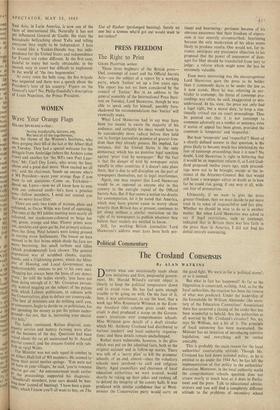GILES PLAYFAIR writes:
Those three bugbears of the British press— libel, contempt of court and the Official Secrets Acts—are the subject of a report by a working party, which `Justice' set up a few years ago. The report has not yet been considered by the council of Justice.' But in an address to the general assembly of the International Press Insti- tute on Tuesday, Lord Shawcross, though he was able to speak only for himself, possibly fore- shadowed the recommendations that `Justice' will eventually make.
What Lord Shawcross had to say may have been too insular to excite the majority of his audience; and certainly his ideas would have to be considerably more radical before they held out to foreign journalists promise of greater free- dom than they already possess. He implied, for instance, that the United States is the only democracy which has no punitive legal sanction against `prior trial by newspaper.' But the fact is that the danger of trial by newspaper exists equally in other countries; if it doesn't take place there, that is due to self-discipline on the part of newspapers themselves, not to legal interference.
Again, one may suspect that Lord Shawcross would be as opposed as anyone else in this country to the outright repeal of the Official Secrets Acts. But if that seems a notion too drastic for contemplation, let it be noted that America, which may have greater cause to worry about security than Britain has at present, continues to get along without a similar restriction on the right of its newspapers to publish whatever they believe their readers are entitled to know.
Still, for working British journalists Lord Shawcross's address must have been both per- tinent and heartening: pertinent because of his obvious awareness that their freedom of expres- sion is too severely circumscribed; heartening because the very moderation of his ideas seems likely to produce results. One would not, for in- stance, anticipate any passionate objection to his proposal that the power of assessment of dam- ages for libel should be transferred from jury to' judge: a reform which might none the less be extremely valuable.
Even more interesting was the encouragethent Lord Shawcross gave the press to be bolder than it commonly dares to be under the law as it now stands. Here he was referring in par- ticular to contempt; the threat of contempt pro- ceedings was often, he said, exaggerated or mis- understood. In his view, the press not only had a legal right, but a moral duty, to keep a con- tinually critical eye on court proceedings. Thus he pointed out that it is not contempt to comment adversely on a verdict or sentence, even if notice of appeal has been given, provided the comment is `temperate' and `respectful.'
But how `temperate' and `respectful'? Short of a clearly defined answer to tharquestion, is the press likely to become much less inhibited,by the fear of contempt proceedings than it is now? No doubt, Lord Shawcross is right in believing that it would be an important reform if, as Lord God- dard proposed twelve years ago, such proceed- ings were not to be brought, except at the in- stance of the Attorney-General. But that would still leave a newspaper editor in doubt as to how far he could risk going, if any way at all, with- out fear of prosecution.
Ultimately, if we want to give the press greater freedom, then we must decide to put more trust in its sense of responsibility and fair play. Whether we should be wise to do so is another matter. But when Lord Shawcross was asked to say if legal restrictions, such as contempt, indicated that in Britain there was less faith in the press than in America, I did not find his denial entirely convincing.


































 Previous page
Previous page